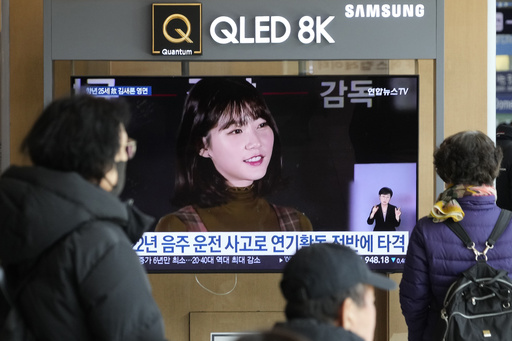
SEOUL, South Korea — In the nearly 1,000 days since her drunk-driving accident in May 2022, Kim Sae-rom, a South Korean actress, has been the focal point of around 2,000 articles from major news outlets. A search through the nation’s press database reveals a barrage of sensational headlines that exemplify how local media often scrutinize a celebrity’s downfall. Once a prominent rising star in the South Korean film industry, Kim faced relentless criticism for various aspects of her life following the incident, including her struggles with finances after being sidelined from acting roles, her decision to work at a coffee shop, her attempt to make a theater comeback, her social outings with friends, and her demeanor on set while filming an indie project.
The alarming circumstances surrounding Kim’s untimely death at 24 on Sunday have reignited discussions regarding the treatment of celebrities in the public sphere. Authorities are investigating her death as a potential suicide, which adds to an increasing list of tragic celebrity fatalities in South Korea. Experts suggest that the immense pressure experienced by these public figures, combined with the harsh media scrutiny that amplifies every misstep, contributes to such distressing outcomes.
__________
EDITOR’S NOTE: In South Korea, individuals seeking support can access round-the-clock counseling through various dedicated hotlines for suicide prevention. These include helplines such as 1577-0199, 1588-9191, 129, and 1388.
__________
The pressures gripping South Korean celebrities, particularly women, are noteworthy. Kim Sae-rom garnered fame early in her career as a child actor, celebrated for her roles in acclaimed films and dramas. However, her reputation drastically shifted following the incident of May 18, 2022, when she was involved in a car crash while under the influence in southern Seoul. Despite issuing a handwritten apology on social media and compensating around 60 businesses that experienced power outages from the accident, the negative media portrayal continued unabated, severely limiting her acting opportunities.
In April 2023, a Seoul court ordered Kim to pay a fine of 200 million won (approximately $139,000) for the DUI incident. In the wake of the judgment, she expressed her fear of the media’s unflattering coverage, noting that many articles detailing her private life were fabricated. “I’m too scared to say anything about them,” she stated.
Following the crash, various celebrity gossip platforms on YouTube proliferated negative narratives about her personal life, insinuating without evidence that her claims of financial hardship were exaggerated. They also criticized her for socializing with friends, arguing that it was indicative of a lack of remorse. Many female entertainers who encounter legal problems, such as DUIs or substance abuse, often face difficulties in resuming their careers, causing them to shun mental health support for fear of more adverse media coverage.
Kwon Young-chan, a comedian and scholar who aids celebrities with mental wellness issues, mentioned that celebrities often feel cornered when the media turns against them after years of maintaining a positive public image. Kwon, having been at Kim’s family’s sides during the traditional three-day mourning period, indicated that her family was exploring legal options against a prominent YouTuber for alleged unfounded attacks on Kim’s private life.
Peter Jongho Na, a psychiatry professor at Yale, expressed concern over a societal model in South Korea that mirrors the survival drama “Squid Game,” where individuals who falter are swiftly abandoned.
Authorities from the National Police Agency stated that no foul play was evident at Kim’s residence, and she left no suicide note. Nevertheless, the tragic trend of high-profile celebrity deaths has raised questions surrounding the media’s role in shaping the public narratives about these figures and the potential impact of critical online comments on their mental well-being. This conversation echoes past tragedies, including the passing of actress Choi Jin-sil in 2008, her former spouse Cho Sung-min in 2013, and K-Pop stars Sulli and Goo Hara in 2019, in addition to actor Lee Sun-kyun in 2023.
Unverified and often sensational claims proliferated through social media have been notably picked up and amplified by traditional news outlets striving for greater audience engagement, as indicated by Hyun-jae Yu, a communications expert at Sogang University. Amid dwindling readership in traditional media, outlets are drawn to covering viral YouTube dramas, frequently neglecting the essential verification of facts.
In the wake of Sulli and Goo Hara’s deaths, which were linked to severe online harassment, lawmakers proposed various reforms aimed at curbing harsh online commentary, including enhanced real-name policy requirements and regulations against online hate speech. However, none of these legislative efforts have come to fruition.
In an effort to bolster protections for their artists from online harassment, South Korean entertainment agencies are increasingly pursuing legal avenues. Hybe, the agency representing K-Pop sensation BTS and others, frequently informs the public about ongoing lawsuits against malicious commentary on social platforms.
Yu emphasized the need for mainstream media organizations to enhance their self-regulatory measures and exercise restraint in utilizing YouTube content as credible news sources. He also pointed out that authorities should compel social media platforms to take greater responsibility for the user-generated content, insisting on active removal of harmful videos and preventing monetization of such content.
YouTube has stated that it is actively enforcing community guidelines to combat threats, harassment, and hate speech, warning that channels that consistently violate these standards risk losing their monetization capabilities or facing termination. Heo Chanhaeng, an executive at the Center for Media Responsibility and Human Rights, suggested that news organizations reconsider allowing comment sections on entertainment articles altogether, arguing that Kim’s private life was unjustly scrutinized far beyond what could be justified as a matter of public interest.

